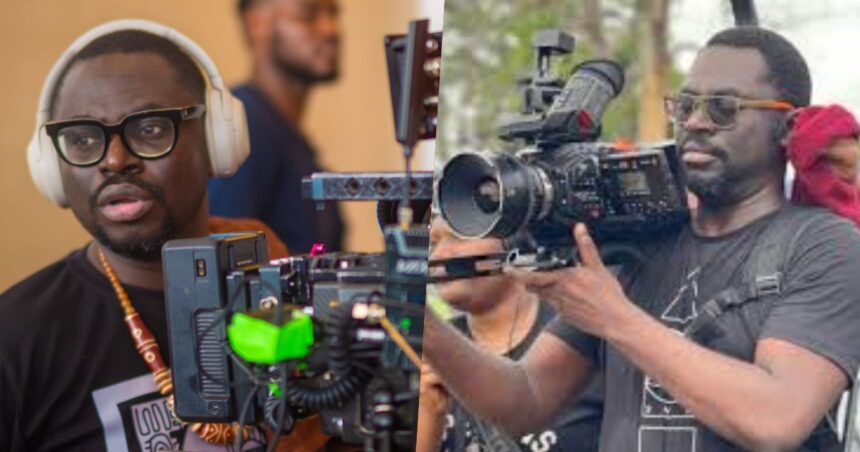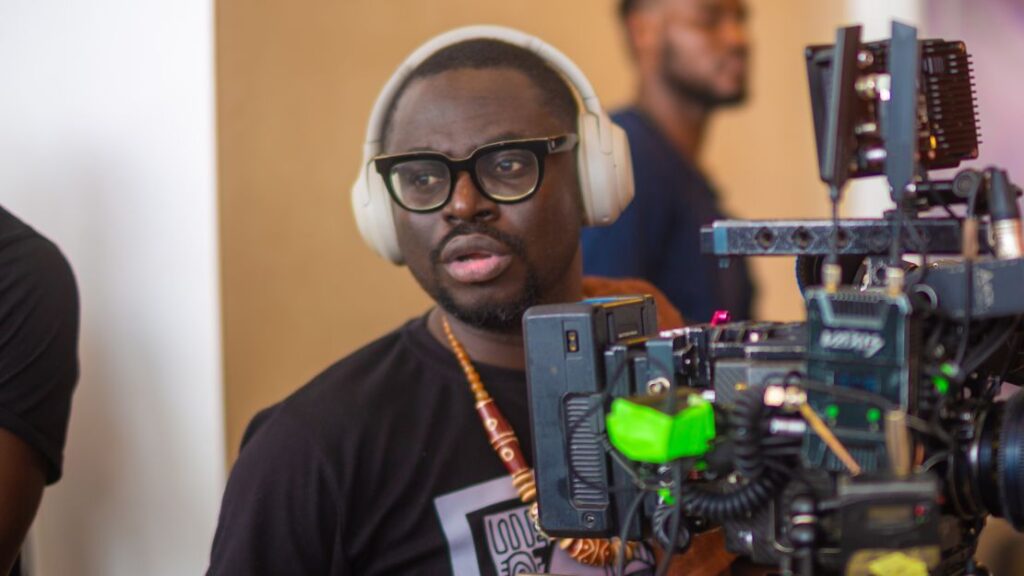Niyi Akinmolayan, a Nigerian filmmaker and director as well as the founder and creative director of Anthill Studios, a media production outlet, expressed himself on the power of communal/community filmmaking in Yoruba films in one of his tweets on X, the social medium formally known as Twitter, saying:
“Making Yoruba films helps you see the power of communal filmmaking, where it is believed that everyone has a creative voice and can contribute to the story. This allows us to always find the best version of a scene and keep tweaking it as long as it works. Sometimes moving away from the original scene plan.”
The post was accompanied by a video, which shows Niyi Akinmolayan, the SFX supervisor, Adebayo Tijani and Tope Adebayo, co-directors, Femi Adebayo, and Ibrahim Yekini Itele on the set of the newly renowned Yoruba epic titled Jagunjagaun. In the video, we see them all arguing about a certain scenario that was going to be shot in a lighthearted and community atmosphere.
Normally, by that point in production, everything about the sequences has been straightened out, but we see them in the video still debating what should be added to a specific scene for a more realistic outcome. We get a better sense of the communal spirit of filmmaking in the video because we see not only the creative process, in which everyone’s voice or opinion contributes to the story, but also the cordial and amiable ambiance of the production set, basking in-jokes, laughs, and affection from other people.
We live in an era where individual self-expression is celebrated, the individual is of supreme consequentiality in society, and collectivism is relegated to secondary importance that pulls the individual back from achieving their goal. But from Niyi Akinmolayan’s tweet and video, we see that this is far from the truth. So, in context, what is communal filmmaking, really? A collaborative and interactive approach to filmmaking is referred to as communal filmmaking. It engages a community of individuals in numerous areas of the filmmaking process, including scripting, directing, acting, editing, and more.
This method stresses collaborative creative input, which can result in various perspectives and inventive narratives. It is a method of including people from all backgrounds and skill sets in the filmmaking process, establishing a sense of community and ownership. This embodies the video’s creative, participative, and filmmaking processes, in which we see professionals and amateurs from all backgrounds attempting to contribute their opinions and create the best storytelling.
Communal filmmaking has been an inherent feature of Nollywood, where filmmaking is a collaborative communal endeavor focused on the production and promotion of artistic, pedagogic, and cultural views and values. This collaborative filmmaking in Nollywood takes numerous forms, such as the pooling of both financial and material resources for low-budget films, which we have heard about. Due to Nollywood’s decentralized and informal production structure, which encourages cooperative filmmaking, filmmakers, actors, and crew members routinely collaborate on many films.
Many prominent comedians, such as Mr. Macaroni, have transitioned from skit-making to full-fledged performers working with professional directors thanks to this technique of filmmaking. Onookome Okome, a scholar and expert in African cinema, discusses communal filmmaking as a collaborative and participatory process within the context of Nollywood and African cinema.
He emphasizes how Nollywood films often involve contributions from various individuals within a community, ranging from actors to crew members, and how this collective effort contributes to the creation of stories that resonate with local audiences. Okome’s perspective highlights the importance of community engagement and shared cultural experiences in shaping the narratives of Nollywood films.
Communal filmmaking is a filmmaking approach that pervades both the social and cultural essence of a specific ethnic community in the framework of Nollywood, and it is not limited to the creative process. In this case, the collective filmmaking process incorporates stories that the audience is all too familiar with due to common cultural ideas and experiences. Whether or if allegations of witchcraft, dubbed Juju in local parlance, are accurate is another matter entirely, because collective filmmaking exposes local problems, traditions, and beliefs.
It should be noted that, while community filmmaking in Nollywood emphasizes the importance of collaboration in film production, this does not negate the importance of individuals in the industry, but rather promotes an environment in which both amateurs and professionals share their opinions through the director’s gaze. The video in question in this post was shot on the set of Jagunjagun,” a Yoruba Nollywood epic that exhibits collective filmmaking prowess transferred to the screen by co-directors Tope Adebayo and Adebayo Tijani, and the film is currently the rave of Nollywood.












